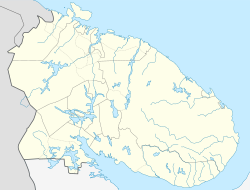Murmansk, Russia
| Murmansk (English) Мурманск (Russian) |
|
|---|---|
| - City - | |
 Murmansk Port |
|
 Location of Murmansk Oblast in Russia |
|
|
|
|
|
|
|
|
|
|
| City Day | October 4 |
| Administrative status (as of November 2014) | |
| Country | Russia |
| Federal subject | Murmansk Oblast |
| Administratively subordinated to | City of Murmansk |
| Administrative center of | Murmansk Oblast, City of Murmansk |
| Municipal status (as of December 2004) | |
| Urban okrug | Murmansk Urban Okrug |
| Administrative center of | Murmansk Urban Okrug |
| Head/Mayor | Dmitry Filippov (Head) Andrey Sysoev (Mayor) |
| Representative body | Council of Deputies |
| Statistics | |
| Population (2010 Census) | 307,257 inhabitants |
| - Rank in 2010 | 61st |
| Population (January 2014 est.) | 299,148 inhabitants |
| Time zone | MSK (UTC+03:00) |
| Official foundation date (see text) |
October 4, 1916 |
| City status since | July 19, 1916 |
| Previous names | Romanov-on-Murman (until April 16, 1917) |
| Postal code(s) | 183000..183099 |
| Dialing code(s) | +7 8152 |
|
|
|
| on | |
Murmansk (Russian: Му́рманск; IPA: [ˈmurmənsk]; Kildin Sami: ; Northern Sami: Murmánska; Skolt Sami: Muurman) is a port city and the administrative center of Murmansk Oblast, Russia, located in the extreme northwest part of Russia, on the Kola Bay, an inlet of the Barents Sea on the northern shore of the Kola Peninsula, close to Russia's borders with Norway and Finland. The city is named for the Murman Coast; Murman is itself an older Russian term for Norwegians.
Despite its extremely-northern latitude of 68°58'N (just 2° north of the Arctic Circle at approximately 66°33'N), Murmansk is in many ways similar to other Russian cities of its size at far-lower latitudes, with highway and railway access to the rest of Europe, and the northernmost trolleybus system on Earth. This is in stark contrast to the isolation of other major Arctic maritime cities such as Dikson, Krasnoyarsk Krai (73°30'N) in the far-north of Siberia on the shores of the Kara Sea or Iqaluit, Nunavut in Canada on Baffin Island's Frobisher Bay off the Labrador Sea (actually further south at 63°44'N). While still having long, harsh winters, Murmansk enjoys somewhat warmer temperatures, relatively speaking, than other regions at similarly high latitudes due to the moderating effects of the Gulf Stream on the Barents Sea.
...
Wikipedia


